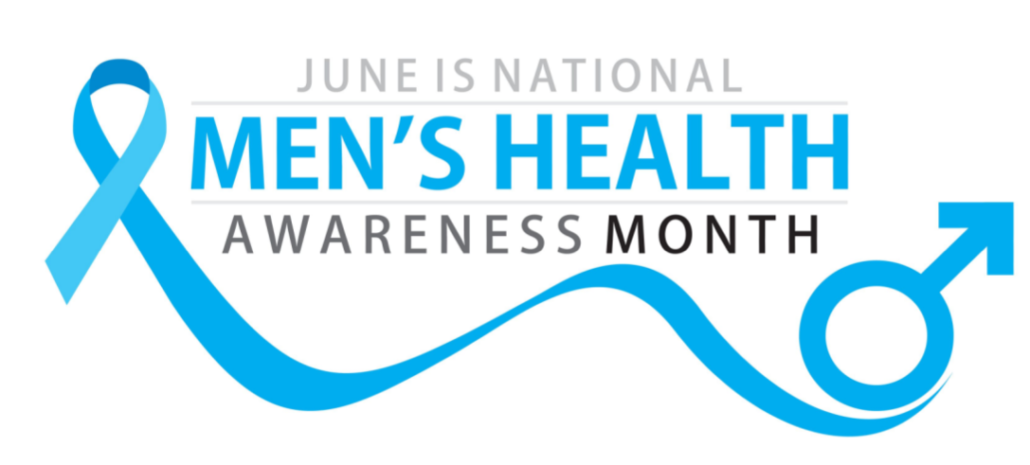
Men’s Health Month is observed every June to help raise awareness about common health issues that affect men and to encourage them to take charge of their health. One important area of focus is prostate health, which many men don’t think about until there’s a problem.
In this article, you’ll learn why Men’s Health Month is important for your prostate health, get practical tips to take better care of yourself, and find helpful resources to support your well-being.
The Importance of Men’s Health Month for Prostate Health
Prostate health plays a key role in men’s overall well-being, and Men’s Health Month is a great time to raise awareness about it. This month highlights the importance of early screenings, education, and taking steps to protect your prostate health. Let’s look at why early detection matters and how Men’s Health Month can support you.
The prostate is a small, walnut-sized gland located just below the bladder. It plays an important role in male reproductive health, especially in producing fluid for semen. However, the prostate is also prone to issues that can affect your quality of life. Common conditions include prostate cancer—the most common cancer in men—benign prostatic hyperplasia (BPH), and prostatitis.
Men’s Health Month highlights the importance of early detection, prevention, and treatment of prostate-related issues. By encouraging men to prioritize their health, this month-long observance aims to increase awareness and promote regular screenings, allowing for the early detection of potential problems.
Important Facts About Men’s Health
According to the CDC and The Indiana University School of Medicine:
- Men are significantly less likely than women to visit a doctor or report symptoms to a healthcare provider. Only about 60% of men attend yearly routine check-ups, and 40% delay seeking care until a serious issue arises.
- Overall, men in the United States continue to face higher health risks. The mortality rate for men is 41% higher than for women, with men experiencing higher death rates in 8 out of the 10 leading causes of death, including heart disease, cancer, accidents, stroke, and diabetes.
- 31% of men experience depression at some point in their lives, and 9% report daily feelings of depression or anxiety. Despite this, only 25% of men speak to a mental health professional, and just 33% take medication for their mental health. It’s crucial to recognize the signs of depression and seek help.
- Prostate cancer remains the second leading cause of cancer deaths among men in the United States. Men are 2 to 3 times more likely to develop prostate cancer if a close male relative, such as a father, brother, or son, has had the disease. It’s important to discuss PSA (prostate-specific antigen) blood tests and digital rectal exams (DRE) with your doctor, especially if you have risk factors.
- Erectile dysfunction affects nearly 30 million men of all ages in the United States. If you’re experiencing issues, consult a urologist to ensure it’s not an early warning sign of more serious conditions like heart disease, high blood pressure, or high blood sugar.
Tips for Men’s Health & Prostate Care
Men’s Health Month supports a holistic approach to men’s well-being. It encourages men to adopt healthy lifestyle choices, including a nutritious diet, regular exercise, stress management techniques, and avoidance of tobacco and excessive alcohol consumption. These lifestyle modifications promote overall health and contribute to better prostate health.
- Regular check-ups – Schedule routine visits with your healthcare provider for comprehensive check-ups. If you’re concerned about your risk of prostate-related conditions, speak to your doctor about screenings.
- Healthy diet and lifestyle – A balanced diet rich in fruits, vegetables, whole grains, lean proteins, and healthy fats can provide essential nutrients and antioxidants that support prostate health. Regular exercise, weight management, and limiting alcohol consumption are important lifestyle factors.
- Hydration – Staying adequately hydrated promotes overall health. Aim to drink plenty of water throughout the day.
- Know your family history – If you smoke, take proactive steps to quit. Smoking leads to an increased risk of cancer and other health issues.
- Quit smoking – If you smoke, take proactive steps to quit. Smoking leads to an increased risk of cancer and other health issues.
- Stress management – Chronic stress can negatively impact overall health, including prostate health. Prioritize stress management techniques such as exercise, meditation, deep breathing, or engaging in hobbies and activities you enjoy.
Staying Ahead of Prostate Health: Important Screenings for Every Stage of Life
Prostate health plays a crucial role in men’s overall well-being, particularly as they age. Being proactive with regular screenings can help detect potential issues early, when they are most treatable. Here’s how prostate health fits into the broader picture of recommended screenings for men at different stages of life.
Prostate Health in Young Men (Ages 18–39)
While prostate cancer is rare in younger men, this is the ideal time to build healthy habits and establish a baseline for future monitoring. During yearly wellness visits, doctors typically check blood pressure, body weight, and waist circumference, and discuss overall lifestyle habits.
Though prostate-specific screenings aren’t common at this age, talking to your doctor about your family history is important. Men with a father or brother who had prostate cancer may face a higher risk and may need earlier monitoring later on. Building a healthy lifestyle early—including regular exercise, balanced nutrition, and avoiding smoking and excessive alcohol—can support prostate health for years to come.
Prostate Health Focus for Men Over 40
After 40, prostate health becomes a more regular part of routine medical conversations. Men with an increased risk, such as those with a family history or African American men, may be encouraged to start prostate-specific screenings earlier than the general population.
As part of your annual check-up, your doctor may recommend a prostate exam or a PSA (prostate-specific antigen) blood test, depending on your risk factors. PSA testing can help detect signs of prostate cancer at an earlier stage, although it’s important to have a detailed discussion with your doctor about the benefits and risks.
Cancer screenings may also extend to colon and lung health, depending on personal history, but prostate monitoring remains a key focus in this age group.
Prostate Health for Men Over 65
For older men, prostate health becomes even more important. Regular prostate exams and ongoing PSA monitoring help detect changes in the prostate early. Early detection enables a wider range of treatment options—including minimally invasive options like the TULSA Procedure—that can help maintain quality of life.
At this stage, ongoing discussions about prostate cancer, treatment options, and urinary function become essential. Doctors also assess for other age-related conditions, such as osteoporosis and cardiovascular disease, to provide a comprehensive picture of overall health.
Men over 65 should continue regular screenings for prostate, colon, and lung cancers, along with eye exams and fall risk assessments, to support long-term independence and vitality.
Why Early and Regular Prostate Screening Matters
Prostate disease can often develop without noticeable symptoms at first. Regular conversations with your doctor about your prostate health—and timely screenings based on your age and risk factors—can lead to earlier diagnosis and more treatment choices.
Minimally invasive options like the TULSA Procedure are changing the way prostate disease can be treated, offering men safer, more personalized care that protects quality of life.
How to Observe Men’s Health Month
During Men’s Health Month, healthcare providers, organizations, and communities come together to offer resources, education, and support. They work tirelessly to dispel misconceptions, encourage open conversations, and empower men to take control of their prostate health. Through awareness campaigns, workshops, and community events, men can learn about risk factors, symptoms, and treatment options for prostate-related conditions.
Here are a few ways you can help promote Men’s Health Month:
- Educate yourself – Take time to educate yourself about men’s health issues, including prostate health, prostate cancer treatment, mental health, heart health, and overall well-being. Read reputable sources such as articles and research studies to stay in the know and make informed decisions about your health.
- Wear blue – Help spread the knowledge of Men’s Health Month by wearing blue. ‘Wear Blue Day’ is a day to raise awareness and funds for men to get regular check-ups and educate the public on prostate cancer, testicular cancer, and other health issues that affect men.
- Spread the word on social media – Social media is a great tool to broadcast Men’s Health Month. Help spread the word by using the hashtags #MensHealthMonth and #ShowUsYourBlue
- Encourage open conversations – Break the stigma surrounding men’s health by encouraging open conversations. Discuss mental health, prostate health, and general well-being with your peers, family, or support groups. By sharing experiences and concerns, you can create a supportive environment and encourage others to seek help when needed.
- Get involved in community events – Participate in local Men’s Health Month events and activities organized by healthcare organizations, community centers, or men’s health advocacy groups. Attend health fairs, seminars, workshops, or screenings to learn more about men’s health issues and gain valuable insights.
- Seek support – If you’re facing health concerns, don’t hesitate to ask for support. Consult healthcare professionals, join support groups, or access online resources specific to men’s health. Remember, seeking help is a sign of strength and a crucial step towards maintaining your well-being.
- Play an active role in your health – Prevention is key when it comes to your health. Adopting healthy habits is one of the best ways to observe Men’s Health Month and promote your overall well-being.
- Be mindful of mental health – Men’s Health Month isn’t just about physical health, but also mental and emotional well-being. Take time to prioritize self-care and stress management techniques such as mindfulness, meditation, yoga, or engaging in hobbies that bring you joy and relaxation.
Remember, the small actions you take during Men’s Health Month can significantly impact your overall health and well-being. By observing this month and actively engaging in healthy activities, you invest in a healthier and happier future.
To learn more about your prostate health, visit our blog and stay connected with us through social media.
May 21, 2025 | Cole Parrish
 Find a Center
Find a Center Contact Us
Contact Us
